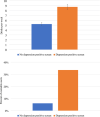Substance use, depression, and loneliness among American veterans during the COVID-19 pandemic
- PMID: 34411394
- PMCID: PMC8441617
- DOI: 10.1111/ajad.13211
Substance use, depression, and loneliness among American veterans during the COVID-19 pandemic
Abstract
Background and objectives: Behavioral health issues, such as substance use, depression, and social isolation, are of grave concern during COVID-19, especially for vulnerable populations. One such population is US veterans, who have high rates of pre-existing behavioral health conditions and may thus be at-risk for poorer outcomes. The current study aimed to investigate substance use among US veterans during COVID-19 as a function of pre-existing depression, loneliness, and social support.
Methods: We investigated the relationship between pre-pandemic depression and substance use during COVID-19 using linear (alcohol) and logistic (cannabis) regression among a large sample of US veterans (N = 1230). We then tested if loneliness and social support moderated these effects.
Results: Though there was a decrease in alcohol and cannabis use among the overall sample, veterans who screened for depression prior to the pandemic exhibited higher levels of substance use after the pandemic's onset. Loneliness compounded the effects of depression on rates of alcohol use. Social support was not protective for the effects of depression on either alcohol or cannabis use.
Discussion and conclusions: Veterans with pre-existing depression may be in need of attention for substance use behaviors. Interventions aimed at alleviating loneliness among veterans may be useful in mitigating alcohol use, but not cannabis use, amid COVID-19.
Scientific significance: Our findings are among the first to report tangible behavioral health outcomes experienced by US veterans as a result of COVID-19. Results can help inform treatment efforts for veterans who are struggling with substance use during and post-pandemic.
© 2021 American Academy of Addiction Psychiatry.
Conflict of interest statement
The authors declare that there are no conflict of interests.
Figures


References
-
- Horigian VE, Schmidt RD, Feaster DJ. Loneliness, mental health, and substance use among US young adults during COVID‐19. J Psychoact Drugs. 2020;53:1‐9. - PubMed

